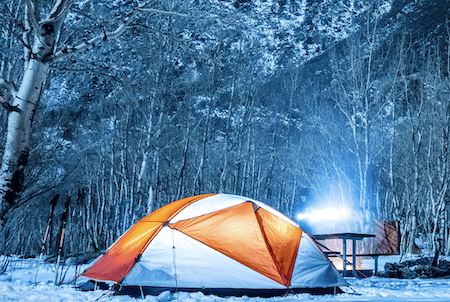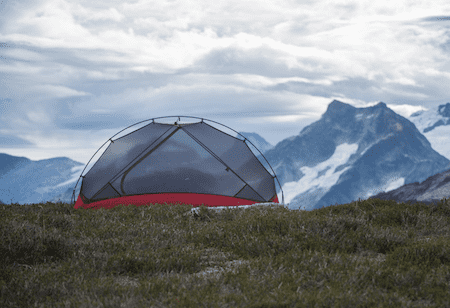When you are camping in the wild outdoors, you may have to face certain hazards, including heavy winds. Well, the wind is among the most powerful elements which can force your tent to collapse or completely blow away.
So, you must set up your tent in the right place and secure it as much as possible. But do you know how much wind can a tent withstand?
Don’t worry. To assist you, here we will give you an overview of the wind resistance capabilities of various types of tents, so that you may go camping with such preparation by observing the wind speed in the weather forecast.
Furthermore, we will provide you with some guidelines to assist you in securing your tent against strong winds to the fullest degree possible. Let’s continue reading.
How Much Wind Can A Tent Withstand?
Basically, tents are intended to protect you from various factors such as rain, wind, and most pests while you relax and enjoy outdoor moments. However, the wind is a very important element that can make you concerned.
Well, without anchors, most tents can resist winds of up to 20 to 30 mph and when stakes are employed properly, this speed is increased to 40 miles/hour. But a large number of tents are not designed to resist wind gusts of more than 50 miles/hour.
So, below, we’ll go through some of the tents and their wind resistance capability so that you can get a general idea of the context:
#1. Wind Withstanding Capacity Of A 2 Season Tent
Two-season tents are designed for summer and spring camping, and if you look at their built material, you will see that this type of tent comes with a lightweight form factor with thin poles and stacks.
However, we discovered in our research that these 2 season tents are capable of withstanding wind for up to 15 to 20 km per hour. So if you are planning to go camping in such stormy weather, you must avoid the 2-season tents.
#2. Wind Withstanding Capacity Of A 3 Season Tent
Three-season tents are generally substantially more wind-resistant than two-season tents. If you have a high-quality three-season tent, you may expect it to endure winds of up to 20 to 30 miles per hour.
Furthermore, if you get a high-quality 3-season tent and set it up in a safe location, it will help you endure winds of up to 40 miles per hour. So, with the appropriate skills, you can utilize your three-season tent in such windy circumstances and at least save yourself.
#3. Wind Withstanding Capacity Of A 4 Season Tent
In comparison to 2 and 3 season tents, 4 season tents are made of more durable materials and have stronger polls and longer stakes. Along with that, a good quality 4 season tent can resist winds of 30 to 40 miles per hour.
However, if you put up your tent in an appropriate location and establish a windbreak around it, then your 4 season tent will be able to withstand winds of up to 50 miles per hour.
#4. Wind Withstanding Capacity Of A Pop-Up Tent
Frankly speaking, pop up tents are not that capable of withstanding high wind because of their lightweight construction and built material. This means even if you buy a good quality pop up tent, it will be able to withstand the wind of up to 30 miles per hour.
So, if the weather prediction indicates that the time you want to go out will be a very windy weather condition, you should not go camping with your pop up tent since it may be entirely blown away if the wind blows at 50 mph.
#5. Wind Withstanding Capacity Of A Military Tent
Military tents are designed specifically for troops and include high-quality construction materials, stronger poles, and larger stakes to endure harsh weather conditions like powerful winds.
In general, military tense can withstand 30 to 40 mph winds, and military personnel know how to secure their tent even in stormy weather, thus military tents will be able to withstand winds of 50 miles per hour.
However, if the wind speed exceeds 50 mph, the poles and stacks will rise from the ground, causing your tent to be blown away.
So that was an overview of how much wind can a tent withstand.
How Can You Make Your Tent Sturdy Against The Wind
Well, though you cannot secure your tent from the heavy wind, here are some good practices that may help you stay safe in such weather:
#1. Decide Whether To Camp Or Cancel Your Trip
Before you are going out, make sure you are thinking about and examining the weather. You must examine the weather prediction carefully. Is it simply just winds, or will there be significant storms and hail?
If there is a chance of thunderstorms, it would be good to change the date or cancel the event. Instead of putting yourself in a trouble, stay at home for a few days and go out when the weather is good.
#2. Set Up Your Tent In The Right Place
The wind typically varies in strength depending on the location — it is stronger near lakes or oceans. In addition, valleys and gulches may sometimes form natural wind tunnels having significantly greater wind gusts just about 100 meters down the route or bend.
If there is rain in addition to the winds, make sure you are not pitching your tent in a higher place. Also, make sure you are not setting up at the top of a hill!
#3. Try To Create A Windshield
If you’re in the middle of your journey and there’s a strong wind, you should try to make a windshield out of rocks, or even use snow. I know it’s tricky, but you have to collect some rocks, wood or snow to make a wind-resistant wall. Doing so will help you protect your tent against high wind.
However, it’d be great if you brought a tarp with you because it is easy to set up and can work as an extra layer on your windshield.
#4. Always Carry Some Extra Ropes And Stacks
Extra guylines and robust stakes are recommended. Most tents come with fragile aluminum stakes; it’s a good idea to upgrade to something more durable.
Moreover, you must carry some extra ropes and stakes with you so that you can use them when needed. For instance, you can use some big pieces of rocks as your stacks and tie them in your tent with the extra rope.
#5. Choose The Right Type Of Tent & Understand The Wind Direction
You must buy a three or four-season tent if you are planning to go camping in such extreme weather because if you don’t use a high-quality tent, then it will not help you withstand high-quality wind.
Along with that, while you are at the camping site, make sure you check the wind direction before you put up your tent. Because if you do not understand which direction the wind is blowing, it will not help you remain safe, so you must set up your tent according to the wind’s direction.
So, these are some techniques which you can follow to keep yourself safe against the stormy wind.
Frequently Asked Questions
Are Tents OK In The Wind?
Most tents can endure a minimum amount of wind, however, winds above 30 mph can cause major damage. But if you can create a windshield, then it can withstand up to 40mph.
But remember to bring plenty of plastic bags and rain ponchos. Before putting your clothes and bedding into rucksacks, place them in plastic bags.
Will A Tent Survive 50mph Winds?
Nope. Most tents are designed to resist winds of up to twenty miles an hour without utilizing the pegs or without any wind protection.
Well, this potential is increased to 40 mph when stakes are utilized properly. But a large percentage of tents are not designed to withstand high winds of 50 mph or more than that.
Is A Tent Safe In A Lightning Storm?
You must know that a tent provides no lighting protection. So, you must keep a safe distance from water, damp materials like rope, and metal objects like poles and fences. Although water & metal doesn’t really attract lightning, yet they are great electrical conductors.
However, a lightning flash’s current may readily travel large distances. It’s up to fate.
Final Words
Yes, knowing how much wind a tent can withstand before going camping might save your life. In general, a high-quality tent can resist winds of 15 to 30 miles per hour. However, if the wind speed exceeds 50 miles per hour, the tent may be damaged.
Well, when you camp near water, such as lakes or the beach, it is almost certain to be windy. However, if you take measures such as checking the weather forecast and having adequate pegs, your tent may survive.
Moreover, keep in mind that the greatest defense against bad weather can save your life.


